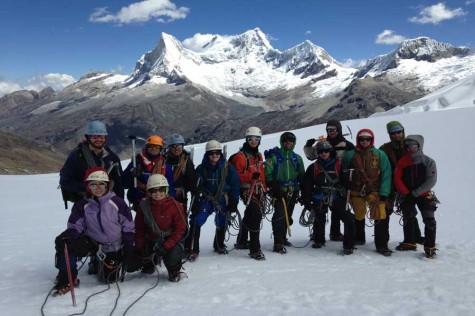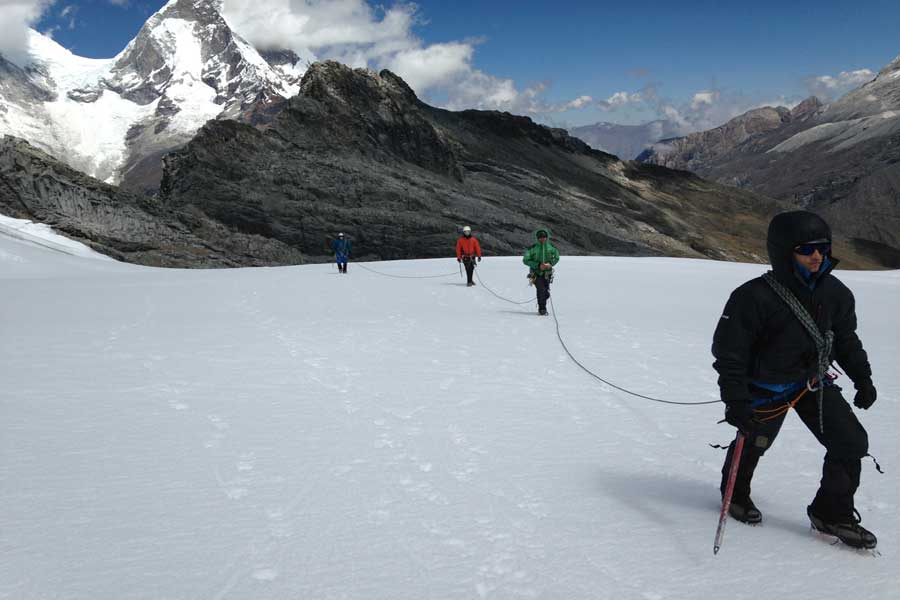Learning outside the classroom, and 18,000 feet up
Moskowitz’s students traverse Yannapaccha
It’s not unusual for outdoor education to step outside the classroom. It is unusual, however, for them to then climb 18,000 feet.
Last spring, 10 students in Professor Brad Moskowitz’s wilderness leadership techniques class got the chance to venture into the wilderness of the southern hemisphere. The students traveled to Peru in late May to practice their leadership skills during trekking and mountaineering expeditions.
The trip was made financially possible in part through a contribution from the president’s fund.
Moskowitz’s wilderness leadership techniques class is a required course for students focusing on adventure education and outdoor leadership. The course curriculum revolves around expedition planning, emphasizing the judgment and decision-making skills essential for any effective outdoor leader.
“On the expedition, students get to practice skills that they have learned in the program here,” Moskowitz said. “They get to take opportunities to be leader of the day, where they are actually making decisions and motivating the group—deciding where to camp, where to break for lunch, which route to take, how to push the group.”
After flying into Lima, the group made their way to the Cordillera Blanca, which Moskowitz called “the world’s most magnificent equatorial mountain range.”
Students summited Yannapaccha, which stands 17,913 feet above sea level.
“During the mountaineering part of the program, we worked with guides from a guide service there,” said Moskowitz. “We had professional mountain guides who were working with us for four days, and on one of those days we summited the mountain. For most of the students, I think that was the hardest thing they’ve ever done in their life.”
It’s crucial that outdoor leaders have the ability to recognize the symptoms of injuries and illnesses that happen in the wilderness, as well as make decisions about what course of action to take. During the journey to the summit of Yannapaccha, the group had a chance at some experiential learning when one student had to turn back due to a severe case of acute mountain sickness. “When you get into other things that could happen—I’m talking about high altitude pulmonary edema, or high altitude cerebral edema—those things are really bad, those are life-threatening,” Moskowitz said. “So [the ill student] wasn’t there. But he was basically at this acute mountain sickness, which is essentially when you feel like you’re completely hungover. You know, dizzy, and your heart rate skyrockets and you can’t really do any physical activity and you have ataxia, which means loss of fine motor coordination and balance. So he was experiencing all those things. Bad headaches, nausea, no appetite.”
Wilderness leadership techniques were not the only skills students developed during the trip. Through their participation in a cultural exchange program, the group worked on their Spanish by spending time with Peruvians learning basic English.
“That was a really awesome experience for them,” Moskowitz said. “We also lived for a couple nights in a friend of mine’s house—a Peruvian family’s home—which was a really great experience for our students as well.”
S
tudents that took part in the trip were interested in the new environment. Alex Sears, a senior in the Outdoor Education major, enjoyed being able to walk around the town talking to Peruvians nearly as much as the actual expedition.
“The whole trip was a huge culture shock for a lot of us,” Sears said. “Some of the kids had never even been out of the country before. It was awesome to get involved in the culture. We got a chance to talk to some kids there and play soccer and really immerse ourselves into the culture. As far as the hiking goes though, the environment and landscapes were like nothing I have ever seen before.”
Moskowitz plans on similar trips for the wilderness leadership techniques class in the future. “This spring we’ll be doing another expedition, probably to the Southwest of the United States,” he said. “Utah, maybe Colorado, New Mexico, Arizona.”

Max Van Wie joined the Basement Medicine staff in Spring 2014, assuming the position of staff reporter.




